By default, PC users are required to have a password to be able to access and use the native Remote Desktop feature in the Windows operating system. In this post, we will show you the steps for the methods on how to enable Remote Desktop without Password in Windows 11/10 to get around User account restrictions are preventing this user from signing in error.

Due to Windows authentication issues which has to do with a user account and password, when you attempt to establish a Remote Desktop connection to a remote Windows-based machine, to remotely logon to the machine, the logon may fail with the Remote Desktop client displaying any one of the following error messages.
Unable to log you on because of an account restriction.
An authentication error has occurred. The Local Security Authority cannot be contacted
Remote Computer: <ComputerName>, A user account restriction is preventing you from logging on. For assistance, contact your system administrator or technical support.
Remote Desktop, A user account restriction (for example, a time-of-day restriction) is preventing you from logging on error on Windows computers
Account restrictions are preventing this user from signing in. For example blank password are not allowed error on Windows
One of the likely reasons you may get any one of these RDP authentication errors could be that you’re trying to connect and log in remotely via Remote Desktop Protocol (RDP) with a user account without a password set or username with a blank (null) password. The obvious solution, in this case, is to set a password which nonetheless is recommended for security reasons for the user account that requires to logon remotely to a computer via Remote Desktop. However, if some reason you’re unable or cannot assign a password to the user account, then you can see below for how you can easily enable remote login with blank passwords.
How to enable Remote Desktop without Password in Windows 11/10
Generally, Remote Desktop is a client application that allows a “client” computer to connect to a “host” computer from a remote location, allowing users to control and use the applications and files on the host device from anywhere. In the Windows OS, by default, if you don’t have a password, the remote desktop won’t work because of the settings in the security policy that is set to not allow or grant a user access without a password.
However, if you want to enable and use remote desktop without a password on your Windows 11/10 computer, you can do so in either of the following ways:
- Configure Local Group Policy
- Configure Local Security Policy
- Modify the Windows Registry
- Disable this Group Policy and see
- Fix Time-of-day restriction.
Let’s look at the description of the steps involved as it relates to each of the listed methods. Note that this configuration to enable blank or null passwords logon must be done on the host computer, that is, the remote computer you intend to remotely control.
If any of the suggestions do not help you, you may reverse the settings.
1] Configure Local Group Policy (GPEDIT.msc)
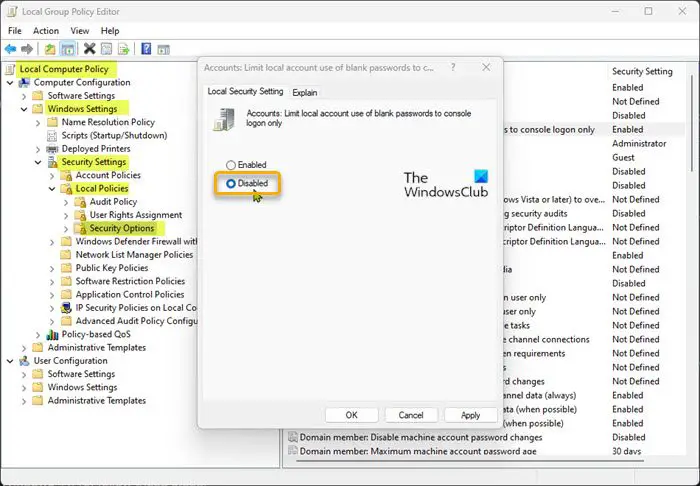
To configure Local Group Policy to enable and use remote desktop without a password on Windows 11/10, follow these steps:
- Press the Windows key + R to invoke the Run dialog.
- In the Run dialog box type gpedit.msc and hit Enter to open Local Group Policy Editor.
- Inside the Local Group Policy Editor, use the left pane to navigate to the path below:
Local Computer Policy > Computer Configuration > Windows Settings > Security Settings > Local Policies > Security Options
- At the location, on the right pane, locate and double-click the Accounts: Limit local account use of blank passwords to console logon only policy to edit its properties.
- In the properties window that opens, set the radio button to Disabled.
- Click Apply > OK to save the changes.
- Exit Local Group Policy Editor.
You can enable and use Remote Desktop (RDP) in Windows Home edition and you can easily add the Local Group Policy Editor feature and then follow the instructions as provided above or you can do the Local Security Policy or tweak the Registry as described below.
Read: The logon attempt failed error while connecting to Remote Desktop
2] Configure Local Security Policy (Secpol.msc)
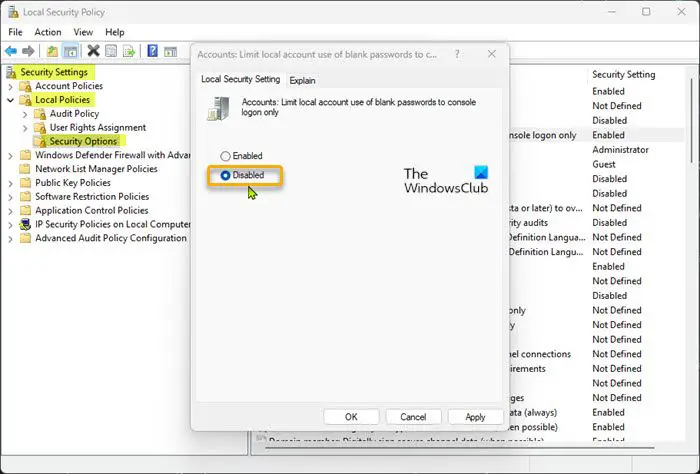
To configure the Local Security Policy to enable and use remote desktop without a password on Windows 11/10, follow these steps:
- Press the Windows key + R to invoke the Run dialog.
- In the Run dialog box type secpol.msc and hit Enter to open Local Security Policy Editor.
- Inside the Local Security Policy Editor, use the left pane to navigate to the path below:
Security Settings > Local Policies > Security Options
- At the location, on the right pane, locate and double-click the Accounts: Limit local account use of blank passwords to console logon only policy to edit its properties.
- In the properties window that opens, set the radio button to Disabled.
- Click Apply > OK to save the changes.
- Exit Local Security Policy Editor.
Read: Harden Windows Login Password Policy & Account Lockout Policy
3] Modify the Windows Registry (Regedit.exe)
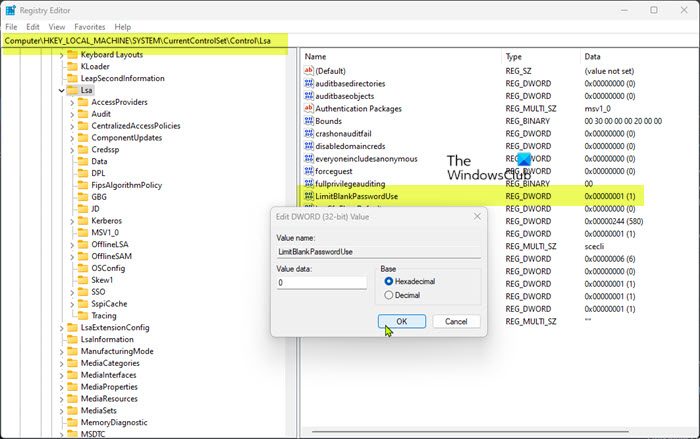
The “LimitBlankPasswordUse” registry key stores the value of the policy set above in the Local Group Policy and Local Security Policy. To allow for Remote Desktop logon with a user account without a password, simply set the value data for the aforementioned registry key to the value 0 so that there is no limit on blank or null password use.
To modify the Windows Registry to enable and use remote desktop without a password on Windows 11/10, follow these steps:
- Since this is a registry operation, it is recommended that you back up the registry or create a system restore point as necessary precautionary measures.
- Press the Windows key + R to invoke the Run dialog.
- In the Run dialog box, type regedit and hit Enter to open Registry Editor.
- Navigate or jump to the registry key path below:
HKEY_LOCAL_MACHINE\SYSTEM\CurrentControlSet\Control\Lsa
- At the location, on the right pane, double-click the LimitBlankPasswordUse key to edit its properties.
- Input 0 in the Value data field.
- Click OK or hit Enter to save the change.
- Exit Registry Editor.
Alternatively, you can create a REG file and then use the file to automatically set the value of the LimitBlankPasswordUse registry key to 0. Here’s how:
- Press the Windows key + R to invoke the Run dialog.
- In the Run dialog box, type notepad and hit Enter to open Notepad.
- Copy and paste the code below into the text editor.
Windows Registry Editor Version 5.00
[HKEY_LOCAL_MACHINE\SYSTEM\CurrentControlSet\Control\Lsa] "LimitBlankPasswordUse"=dword:00000000
- Now, click the File option from the menu and select Save As button.
- Choose a location (preferably the desktop) where you want to save the file.
- Enter a name with .reg extension (eg; SetLBPU0.reg).
- Choose All Files from the Save as type drop-down list.
- Double-click the saved .reg file to merge it.
- If prompted, click on Run > Yes (UAC) > Yes > OK to approve the merge.
- You can now delete the .reg file if you like.
Similarly, you can edit the registry via Command Prompt for the same outcome by following these steps:
- Press the Windows key + R to invoke the Run dialog.
- In the Run dialog box, type cmd and then press CTRL + SHIFT + ENTER to open Command Prompt in admin/elevated mode.
- In the command prompt window, copy and paste the command below and hit Enter:
reg.exe Add "HKLM\SYSTEM\CurrentControlSet\Control\Lsa" /V "LimitBlankPasswordUse" /T REG_DWORD /D "0"
- Exit CMD prompt once the command executes.
4] Disable this Group Policy and see
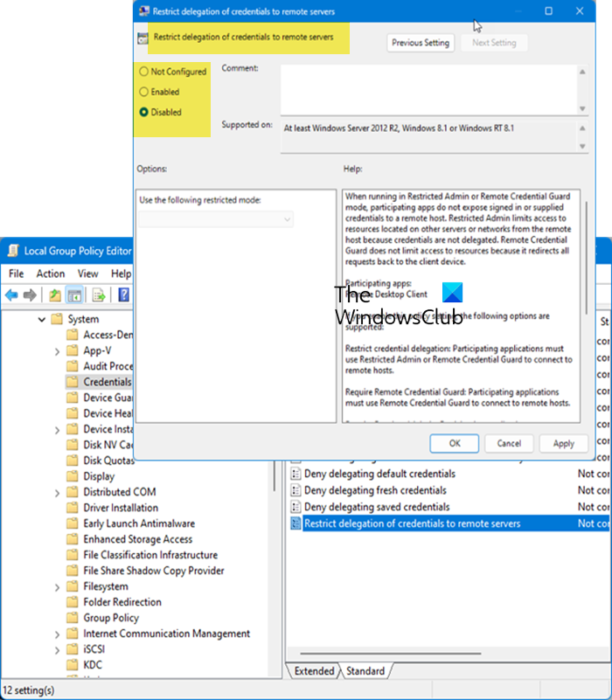
Open the Local Group Policy Editor and navigate to the following setting:
Computer Configuration > Administrative Templates > System > Credentials Delegation
On the right-hand side, locate Restrict delegation of credentials to the remote servers.
Set it to Disabled, click Apply and then hit OK.
See if this helps. If it does not, you may reverse the setting.
5] Fix Time-of-day restriction
If your administrator has set time-of-day restrictions to limit when users can log into the system, open Active Directory Users and Computers, locate the user’s account, right-click, select Properties, and then go to the Account tab and click on Logon Hours to change the permissible times.
Read: Enable or Disable Your remote session will be disconnected RDC prompt
That’s it on how to enable Remote Desktop without a Password in Windows 11/10!
TIP: You can use third-party remote desktop tools like Google Remote Desktop, VNC, TeamViewer, etc as they don’t rely on Windows authentication.
Remote Desktop: A user account restriction (for example, a time-of-day restriction) is preventing you from logging on
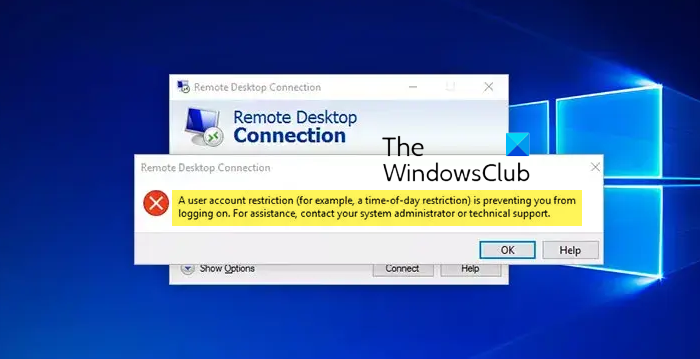
If you receive Remote Desktop, A user account restriction (for example, a time-of-day restriction) is preventing you from logging on error on Windows computers, you need to check the Registry setting or Secpol.msc and reverse the restrictions as mentioned in this post.
Account restrictions are preventing this user from signing in. For example blank password are not allowed
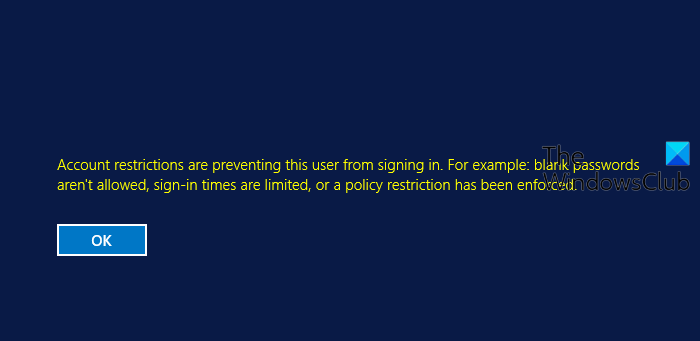
If you see Account restrictions are preventing this user from signing in, For example blank password are not allowed error on Windows, it could be due to a particular Group Policy setting that is stopping the Remote Desktop Client from exposing sign-in credentials to the remote host. Follow the solutions mentioned in this post to resolve the issue.
Also read:
- Enable or Disable Always Prompt for Password upon RDP Connection
- Allow or Prevent saving of Remote Desktop Credentials in Windows
How do I stop RDP from asking for credentials?
- Open Registry Editor.
- Navigate to the key below:
HKEY_LOCAL_MACHINE\SOFTWARE\Microsoft\Windows\CurrentVersion\Policies
- Select System.
- Find and double-click EnableLUA.
- Change its Value data to 0.
- Click OK.
- Reboot your computer for the change to take effect.
Read: Save Remote Desktop Connection Settings to RDP File in Windows
How do I make Windows 11 not ask for password?
To make Windows 11 not ask for password, you need to disable all the security settings, including PIN or Password. You can use the Command Prompt to get the job done quickly. For that, enter net user command first. Then, enter this command: net user USERNAME *. You need to press the Enter key twice to remove the password.
Read: Fix Remote Desktop connection issues & errors on Windows.
Leave a Reply